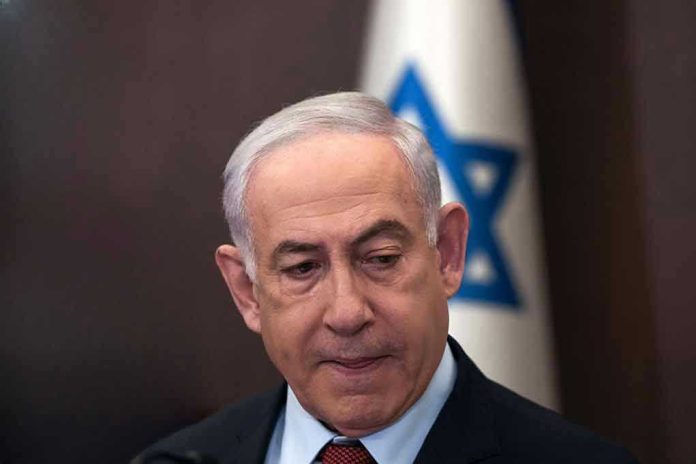
A centuries-old diplomatic chessboard in Jerusalem has just been shaken: Macron’s blunt warning to Israel not to close France’s consulate signals more than a spat—it’s a high-stakes standoff over international access, religious sites, and the future of the city itself.
Story Snapshot
- Macron calls Israel’s plan to close France’s Jerusalem consulate a “major error,” escalating diplomatic tension.
- France’s consulate uniquely serves both French citizens and Palestinians, making it a flashpoint in the wider conflict.
- Jerusalem’s status remains fiercely disputed, with France and most nations refusing to recognize full Israeli sovereignty.
- The standoff could disrupt international access, consular services, and the fragile balance around Jerusalem’s holy sites.
Macron’s Warning: A Diplomatic Line in the Sand
Emmanuel Macron’s direct rebuke to Israel over the possible closure of France’s Jerusalem consulate landed like a thunderclap in diplomatic circles. The French president framed the move as a “major error,” warning of far-reaching consequences if Israel proceeds. Macron’s stance is not just a defense of French interests; it is a broader statement about international law, access to holy sites, and the need for a negotiated solution to the Israeli-Palestinian conflict. By making his warning public, Macron raised the stakes and signaled that France would not quietly accept changes to Jerusalem’s delicate diplomatic equilibrium.
Israel’s government, meanwhile, has signaled a readiness to restrict foreign consulates, citing security and sovereignty concerns. This aligns with a recent trend: Israel has increasingly sought to assert control over all of Jerusalem, including East Jerusalem, where most foreign missions serve Palestinians. The clash reveals fundamentally opposed visions for the city’s future, with France advocating for international access and Israel pushing for exclusive sovereignty.
France’s Consulate: More Than a Diplomatic Outpost
France’s Jerusalem consulate occupies a singular role. Unlike typical consulates, it serves not only French citizens but also Palestinians in East Jerusalem and the West Bank. This dual purpose reflects France’s historical ties and its commitment to support Palestinian civil society. The consulate is a lifeline for travel documents, humanitarian aid, and cultural exchanges—services that would be severely disrupted by closure. For Palestinians, its presence is a tangible reminder of international engagement and support, especially as local options remain limited.
The consulate’s unique status also stems from Jerusalem’s unresolved international standing. France, like most of the world, does not recognize Israeli sovereignty over the entire city, maintaining its consulate in East Jerusalem as a diplomatic mission to the Palestinians. This position is rooted in decades of UN resolutions and European foreign policy, emphasizing that Jerusalem’s final status must be resolved through negotiation, not unilateral action.
Historical Context Fuels Modern Tensions
France and Israel’s relationship is a study in contrasts. After supporting Israel’s establishment in 1948, France became a pivotal military ally, even aiding in the development of Israel’s nuclear program during the 1950s. Yet, as regional politics evolved, France shifted to a more balanced approach, supporting Israel’s security while criticizing its settlement policies and advocating for Palestinian rights. This nuanced posture has often placed France at odds with Israeli governments, especially on Jerusalem’s status and the peace process.
Jerusalem itself remains the heart of the conflict. The city is revered by Jews, Christians, and Muslims alike, and its holy sites are flashpoints for both religious devotion and political confrontation. France’s diplomatic presence—combined with its outspoken advocacy for protecting Christian and Muslim sites—reinforces its role as a guardian of international access and religious tolerance. Macron’s warning, therefore, carries historical weight: it is a defense of France’s legacy and its vision for a negotiated peace.
Implications: What’s at Stake for Diplomacy and Daily Life
The immediate impact of the standoff is heightened diplomatic tension between Paris and Jerusalem. Should Israel close the French consulate, consular services for Palestinians could be disrupted, affecting everything from travel permits to humanitarian aid. The move would also set a precedent, potentially inviting similar restrictions on other foreign missions and accelerating Jerusalem’s isolation from international engagement.
Long-term consequences loom larger. France-Israel relations could deteriorate, undermining cooperation in areas ranging from security to cultural exchange. The international community may face new barriers to accessing Jerusalem’s holy sites, threatening religious tourism and the city’s cosmopolitan character. Above all, the episode risks deepening polarization in Israeli politics and further marginalizing Palestinian voices in the diplomatic process.
Expert Perspectives: Legal, Political, and Moral Dimensions
Analysts and scholars highlight the symbolic importance of the French consulate, warning that closure would undermine diplomatic norms and isolate Palestinians. Legal experts point out that the consulate’s status is protected under international law, and unilateral action by Israel could trigger global condemnation. While some commentators cite Israeli security concerns, others interpret the move as part of a broader strategy to consolidate control over Jerusalem and sideline international involvement. Across the spectrum, the consensus is clear: the standoff is a microcosm of the larger struggle over Jerusalem’s future, and the world is watching closely for what happens next.
Whether this crisis leads to a new chapter in diplomatic relations or a deeper freeze remains uncertain. What is clear is that Macron’s warning has exposed the fault lines beneath Jerusalem’s surface, forcing all parties to confront the high cost—and profound significance—of their next move.
Sources:
France and Israel — French Ministry for Europe and Foreign Affairs
France–Israel relations — Wikipedia
France-Israel Relations: A Tale of Intimacy With No End in Sight — Counterfire
France and the Six-Day War — Six Day War Project







